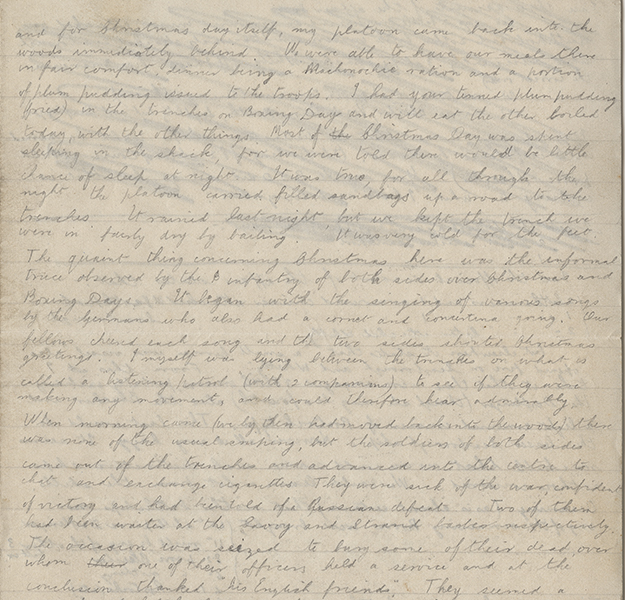When the fighting stopped for Christmas: Soldier describes ‘quaint’ truce of 1914

News from the front: Gerald Blake's 1914 Christmas letter mentioned the now-famous truce between the two warring sides. 'The quaint thing concerning Christmas here was the informal truce observed by the B infantry of both sides over Christmas and Boxing Days,' he wrote in the letter. 'It began with the singing of various songs by the Germans who also had a cornet and concertina going. Our fellows cheered each song and the two sides shouted Christmas greetings.'
By now, it’s common knowledge that on Christmas 1914, pockets of soldiers along the Western Front emerged from their opposing trenches and, instead of killing each other, exchanged good wishes, songs, chocolate and cigarettes.
They would soon go back to their bloody business, but that poignant disruption of hostilities, in the early months of the First World War, has since become a symbol of peace and humanity, contrasting sharply with an otherwise bleak and tragic episode in human history.
The spontaneous and unofficial truces of exactly 100 years ago have since been portrayed — and often embellished — in movies, books and even commercials.
The idea of taking a break from the war to celebrate Christmas is remembered so fondly, perhaps, because it contrasts so sharply with what we now know about the years that would follow, when the carnage would wipe clean whole stretches of the landscape, and the mud would swallow thousands of bodies forever.
As many as 10 million military personnel would die in the war.
But at Christmas time of 1914, the idea of a holiday truce — in a war that was originally expected to be over by Christmas in the first place — was not yet as poetic as it would be when viewed in retrospect.
This may explain why Gerald Blake, a Londoner in the British Expeditionary Force, offered only a few lines about it in a letter to his brother, Clive.
“The quaint thing concerning Christmas here was the informal truce observed by the B infantry of both sides over Christmas and Boxing Days,” he wrote in the letter, which is now part of the McMaster Libraries’ William Ready Division of Archives and Research Collection. “It began with the singing of various songs by the Germans who also had a cornet and concertina going. Our fellows cheered each song and the two sides shouted Christmas greetings. I myself was lying between the trenches on what is called a ‘listening patrol’ (with 2 companions) to see if they were making any movement, and could therefore hear admirably.
“When morning came (we by then had moved back into the woods) there was none of the usual sniping, but the soldiers of both sides came out of the trenches and advanced into the centre to chat and exchange cigarettes.”
McMaster’s archives contain about 60 letters from Blake, but the collection ends abruptly in June 1916. Blake would be killed in action on the first day of the Battle of the Somme.
A detailed description of the letter, a transcription and more context are available on the library website Peace and War in the 20th Century.

